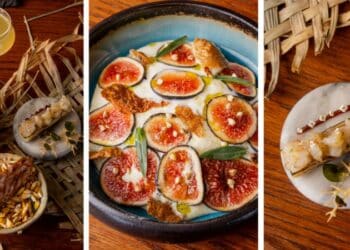 Tamoka, Dubai’s premier destination for beachside dining, is proud to announce its ongoing commitment to sustainable practices and initiatives. From the bar to the kitchen, Tamoka employs a variety of sustainable practices such as ensuring locally sourced and produced ingredients, products and technologies.
Tamoka, Dubai’s premier destination for beachside dining, is proud to announce its ongoing commitment to sustainable practices and initiatives. From the bar to the kitchen, Tamoka employs a variety of sustainable practices such as ensuring locally sourced and produced ingredients, products and technologies.
In the kitchen, Tamoka’s team prioritise in-house vertical farming and homegrown products, working closely with suppliers to source the best available produce, often visiting warehouses and sampling new products to ensure the highest quality. Each menu is carefully curated to ensure planning and dish development reflects these practices as much as possible.
“Sustainability and local sourcing of products are at the forefront of everything we do in the culinary department. The vertical farm is a cornerstone of this approach, promoting an environmentally friendly mindset and ensuring the highest quality products for our guests. Above all, it aligns with our core values.” – Chef Tobias Pfister
Signature dishes that highlight these sustainable ingredients include:
- FAINA (D, V): Chickpea and truffle paste flatbread, wild mushrooms, salted ricotta, and truffle oil.
- PUERROS (D, N, G, V): Charred leeks, mole blanco, toasted almonds.
- POMELO Y REMOLACHA (VG): Heritage beetroot, carrot, pomelo, alfalfa, roasted seeds.
- PARGO ROJO: Pan-fried local red snapper, avocado-mango salsa.
- DE LA HUERTA (G, D): Dry-aged seared tuna, homegrown leafs, edamame, croutons, spiced yogurt
- FRESCO DE COLIFLOR (N, VG): Cauliflower, palm dressing, toasted hazelnut
- BERENJENA (G, D, V): Baked eggplant, tomatoes, burrata, coriander pesto
- HUMITA SIN CHALA (VG): Creamy sweetcorn quinoa, plant based sofrito
- HOJAS VERDES (VG): Green leaves salad from our vertical farm
- TIRADITOS DE PIÑA (VG): Pineapple Carpaccio, kiwi, passion fruit, coconut sorbet
To minimise food waste, the kitchen employs careful menu engineering, accurate ordering based on business levels, effective stock control and rotation, and utilises off-cuts for other preparations. The WINNOW system is used to monitor wastage, and chefs receive full training to empower awareness and a team commitment to a sustainable-forward culture.
The bar reduces its environmental impact by carefully measuring ingredients to avoid overpouring and excess usage, and by using eco-friendly alternatives such as straws made from dried grain stems. These biodegradable straws provide a similar drinking experience to plastic straws without the negative ecological footprint.
Moreover, the bar team prioritises reusing ingredients whenever possible. Citrus fruits are juiced, and their remnants are utilised as garnishes or in homemade cordials. Locally sourced ingredients are also a key focus, reducing the carbon footprint associated with transportation.
Tamoka’s cocktail recipes are crafted with sustainability in mind. When bubbles expire or lose their fizz, they are remade into cordials, giving cocktails a creamy texture. The bar also explores alternatives to commonly used ingredients with environmental concerns, selecting sustainably sourced or renewable options for garnishes and mixers. Tamoka communicates its sustainability efforts through a thoughtfully designed menu that highlights these practices. Sections of the menu promote organic wines and beverages partnered with organizations supporting the development and education of challenged kids.
Guests appreciate Tamoka’s commitment to sustainability and often engage in conversations about the eco-friendly practices implemented. This trend in the cocktail world has led some customers to specifically seek out establishments like Tamoka that prioritise conscious initiatives.
Mina Kokanovic, General Manager of Tamoka and Caña by Tamoka comments: “Being a beachside destination, we have always been committed to supporting sustainability. With our kitchen prioritising vertical farming and homegrown products, it gave us a platform to extend these practices throughout all our operations.”
“Looking ahead, We at Tamoka are continuously brainstorming and researching new ways to achieve full sustainability in all operations. Key focus areas include enhanced waste management throughout the restaurant, ice waste control, energy conservation, exploring options for reducing single-use plastics, implementing composting programs for organic waste, and collaborating with more local producers. The aim is to integrate sustainability into the core of the business, looking beyond basic initiatives to truly make a difference.” Mina Kokanovic adds.
Implementing sustainability practices is viewed as an opportunity rather than a challenge at Tamoka. Despite upfront cost implications, the team sees these initiatives as an investment in the future and the environment, motivating them to continually do more.



































































